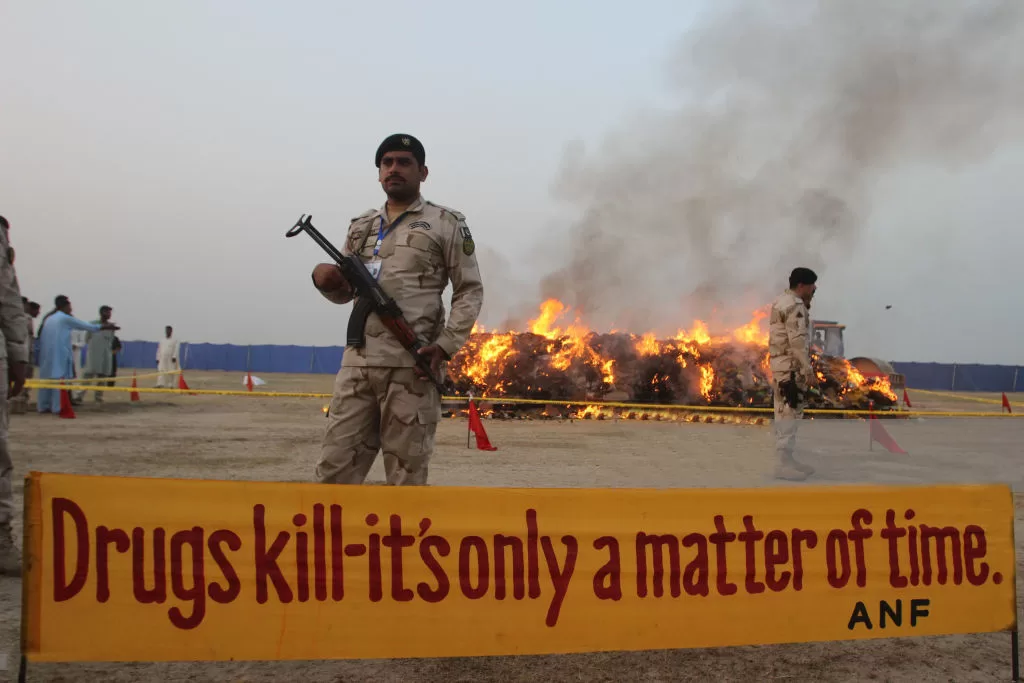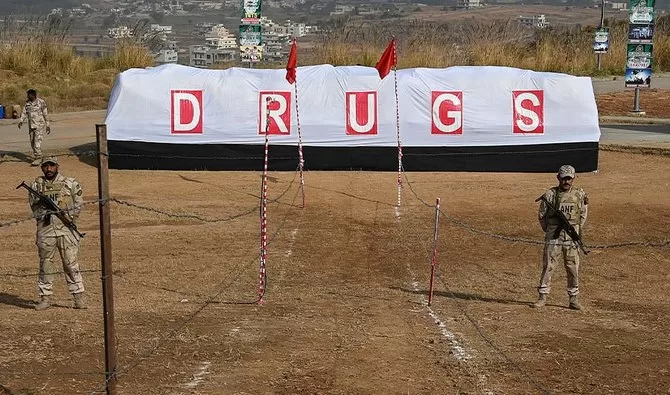In 1993, the Benazir Govt successfully implemented the National Anti-Narcotics Policy 1993 during its tenure. The Policy created various institutions and drug enforcement structures, however an effective mechanism to coordinate and integrate these efforts was lacking. The lack of consolidation in subsequent years resulted in an approach that was not cohesive, this led to continued drug trafficking and proliferation in Pakistani society. The situation has been compounded by a limited availability of treatment centers and data on drug addiction.
Trafficking of Afghan drugs into and through Pakistan and the smuggling of precursor chemicals to Afghanistan for illicit use continues to pose serious challenges to Pakistan’s Law Enforcement Agencies (LEAs) and healthcare system. Proliferation of drugs and psychotropic substances within Pakistani society and the subsequent increase in numbers of drug addicts are emerging challenges, particularly because sale and distribution occurs at the micro-level with responsibility spread across many Government agencies.
For Pakistan, supply reduction requires an integrated strategy of domestic enforcement, border control and international cooperation, both within the region and with partners such as the UN. Keeping that in mind the National Anti-Narcotics Policy 2010, crafted by Federal Secretary Narcotics Control Tariq Khosa, was annunciated last July. It will focus on strengthening LEAs and has a step-down approach from the Federal and Provincial level right down to the Districts in an effort to combat drug trafficking and reduce not only the flow of drugs into Pakistan, but commensurately the health, social and economic costs.
Since inception in 1985 the Anti-Narcotics Force (ANF) has done a magnificent job over the years in having Pakistan declared poppy-free in 2000-01 despite its limited resources. The ANF performance had the world acclaim us a “success story”, Pakistan demonstrated emphatically that eradication of illicit poppy cultivation is possible. Significant amounts of hashish, heroin and morphine have been seized but its capacity needs enhancing to ensure an operationally effective drug law enforcement regime. Since than we have been subjected to both insurgency and terrorism of the worst kind, mainly financed by drugs. The nexus between insurgency, terrorism, drugs manufacturing smuggling and organized crime requires Pakistan’s counter-terrorism and counter-terrorism strategies to be integrated with the poppy-eradication strategy at the national level to ensure a comprehensive approach to transnational crime. With narco-terrorism now a fact of life in Pakistan, steps must be taken to double-task the ANF, with its inherent nucleus of operational and intelligence potential, and convert it, by providing adequate additional personnel and equipment, into full-fledged a Counter-Terrorism Force (CTF).
This new Policy spells out a number of objectives targetting supply reduction, demand reduction and international cooperation, developed in accordance with international best practice, viz (1) Drug supply reduction (a) eliminate poppy cultivation (b) Prevent the trafficking and production of narcotic drugs, psychotropic substances and precursor chemicals and (c) Enhance the capacity of LEAs, and streamline their activities particularly in high intensity drug trafficking areas like KP Province and Balochistan will be increased (2) Drug Demand Reduction (a) Enhance demand prevention efforts through education and community mobilization campaigns and projects (b) develop effective and accessible drug treatment and rehabilitation systems (c) conduct a drug abuse survey to determine the prevalence of drug addiction and (3) International Cooperation (a) Promote and actively participate in bilateral, regional and international efforts to combat drugs (b) Emphasize control of problem at source in poppy growing countries and (c) Demand reduction in destination countries need to be an important part of international efforts.
The Federal and Provincial level entities must be tasked with drug enforcement. Established at each Regional Directorate, Precursor chemical identification units must monitor, review/analyse drug interdiction performance of all LEAs on regular basis and make necessary plans for effective implementation and coordination of enforcement strategies. Provincial Narcotics Control Committees (PNCC) must be reorganized so that all relevant stake holders are involved in coordinating and monitoring policy implementation. One step down District Narcotics Control Cells (DNCC), working through District Govt, will be made more functional and directly responsible for prosecuting known drug traffickers and financiers drug dealers in their own jurisdictions. The prevalence of opioid use in Pakistan is at 0.7 percent of the adult population, the increase in opium and heroin production in neighbouring Afghanistan makes the prevalence of opioid use higher.
Policy 2010 envisages young people being educated about drug abuse through mass education programmes in homes, schools, colleges and work places involving parents, teachers, students, religious leaders, health professionals, community leaders and social workers. Provincial jail departments must develop special training and treatment programmes on drug abuse and drug related HIV/AIDS prevention/rehabilitation.

LEAs need to treat drug users and drug traffickers to be differently, drug users should be assisted with treatment and rehabilitation, be treated as victims rather than criminals. Drug traffickers must be arrested and prosecuted in accordance with the law. All labour unions must be engaged to (1) promote the message against drug abuse, (2) facilitate rehabilitation of drug users and (3) assist their induction back into the work place after their treatment.
Expressing the people’s will, and having a forceful voice at the grassroots level of society, political parties must play an active role against drug proliferation and trafficking. Their participation in the social movement against would provide a great impetus. Broader public awareness campaigns against drug abuse must use the internet, mobile phones, radio and TV mediums to carry out mass education and community participation programmes. The Ministry of Narcotics Control in collaboration with Ministry of Religious Affairs must develop special courses on drug abuse prevention to create awareness for both students and teachers, particularly in Madrassahs.
Effective, efficient and accessible drug treatment and rehabilitation centres (including those under the umbrella of NGOs) must be mainstreamed into the healthcare system and established in Federal, Provincial and District hospitals in accordance with international best practice and the provision of experts. An estimated 40% of Pakistan’s prison population use drugs. Drug treatment and rehabilitation facilities will be extended to key jails, beginning with Adiala Jail Rawalpindi. Separate treatment centres will be established in five cities for female drug users. A specially designed programme is being developed for street children.
A nation-wide survey will target drug demand reduction and treatment to make rehabilitation programmes compatible with the needs of the drug addict population. National Technical Task Force comprised of psychiatrist, psychologists and NGOs must develop a uniform drug treatment protocol and standard services for government, private and NGO-run drug treatment centers.
Greater emphasis must be placed on coordination and cooperation among Federal ministries, Provincial govts and departments involved in anti-narcotics activities must share responsibility as partners in the implementation of Pakistan’s anti-narcotics policy, active and effective coordination and cooperation is required from them.
Both the Ministry of Narcotics Control, and the ANF have outstanding professionals as leaders. However the Policy cannot be successfully implemented without regional and international cooperation to counter narcotics trafficking. This must include drug-related intelligence sharing, border management as well as joint operations against drug trafficking and precursor chemical smuggling. Enhanced public participation in combating drug abuse, strengthened drug enforcement structures and boosting of treatment and rehabilitation services will achieve the ultimate goal of a drug-free Pakistan.
Courtesy: The News




